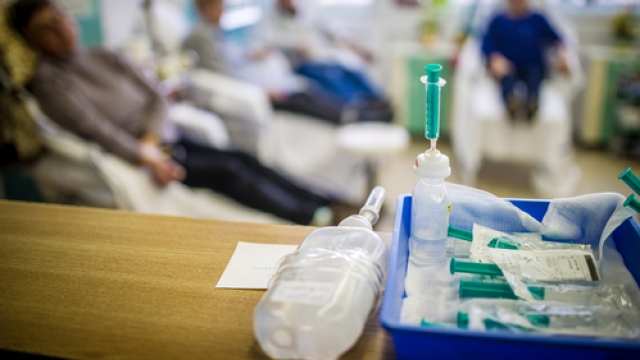A long list of cancer treatment drugs are in short supply, prompting doctors to make difficult decisions about how they treat their patients.
According to the FDA, 14 drugs used for chemotherapy are under a shortage. One of those drugs is carboplatin, which is often used to treat breast cancer as well as other cancers, including ovarian cancer, uterine cancer and lung cancer.
Dr. Eleonora Teplinsky, an oncologist based out of New Jersey who treats women with breast and gynecologic cancer, said she's fortunate her hospital still has carboplatin, but worries it might not last.
Some hospitals are having to ration supply. Some patients have also reported treatment has been delayed because of the shortage.
"To tell a patient that we have this great treatment and it's going to work, but we can't give it to you because it's in short supply is really, I think, one of the hardest things," Dr. Teplinsky said.
According to a new report from the Senate Commiteee on Homeland Security and Governmental Affairs, drug shortages increased by nearly 30 percent between 2021 and 2022.
SEE MORE: New recommended age for breast cancer screenings
"We have not seen a shortage like this on this scale, at least in the last ten years that I can recall." Dr. Teplinsky said.
The shortages aren't just putting patients at risk; clinical trials that depend on these drugs could also be in danger.
"How is that going to impact the data if we can't give patients the drug that they need? So there, you know, the repercussions are really immense," Dr. Teplinsky said.
When it comes to drug shortages, Dr. Arif Kamal, chief patent officer with the American Cancer Society said newer drugs don't generally face drug shortages. It's the tried-and-true drugs that eventually come off patent which then allows other companies to produce generic versions, incentivizing companies to make new drugs instead and reducing production on the less profitable ones.
"What is not clear is as a drug comes off patent, what is the strategy to ensure that there is a continued uninterrupted supply chain of the drug that aligns with the economic incentives that a manufacturer would need," Dr. Kamal said.
Angels For Change, an advocacy group whose mission is to end drug shortages, gave testimony in a hearing last month before the House Energy and Commerce Committee. The organization's founder, Laura Bray, said transparency is needed to prevent drug shortages from happening.
SEE MORE: AI discovers potential new cancer treatment in just 30 days
"This marketplace is deeply fragmented," Bray said during the hearing. "Everyone I think talked about transparency today. We do need transparency. There's gaps in knowledge and until we have a clear picture, we can't address the right solutions for the right problems."
Bray also said collaboration is needed.
"It includes the FDA, it includes the supply chain members, it includes the manufacturers and the hospitals. How do we align our incentives to get as many patients the needed drugs that they deserve," Bray said. "And that's, you know, the one message I want to say: We need to be connected and collaborate, but then there needs to be tools of connectivity so we can scale."
It's unclear when the shortages will end. The FDA told Scripps News in a statement that while it can't require a pharmaceutical company to make a drug and make more of it, it's working with multiple manufacturers and others in the supply chain to understand what's going on so it can help reduce the impact these shortages have. It also added manufacturers expect drug supply to increase in the near future.
Trending stories at Scrippsnews.com



